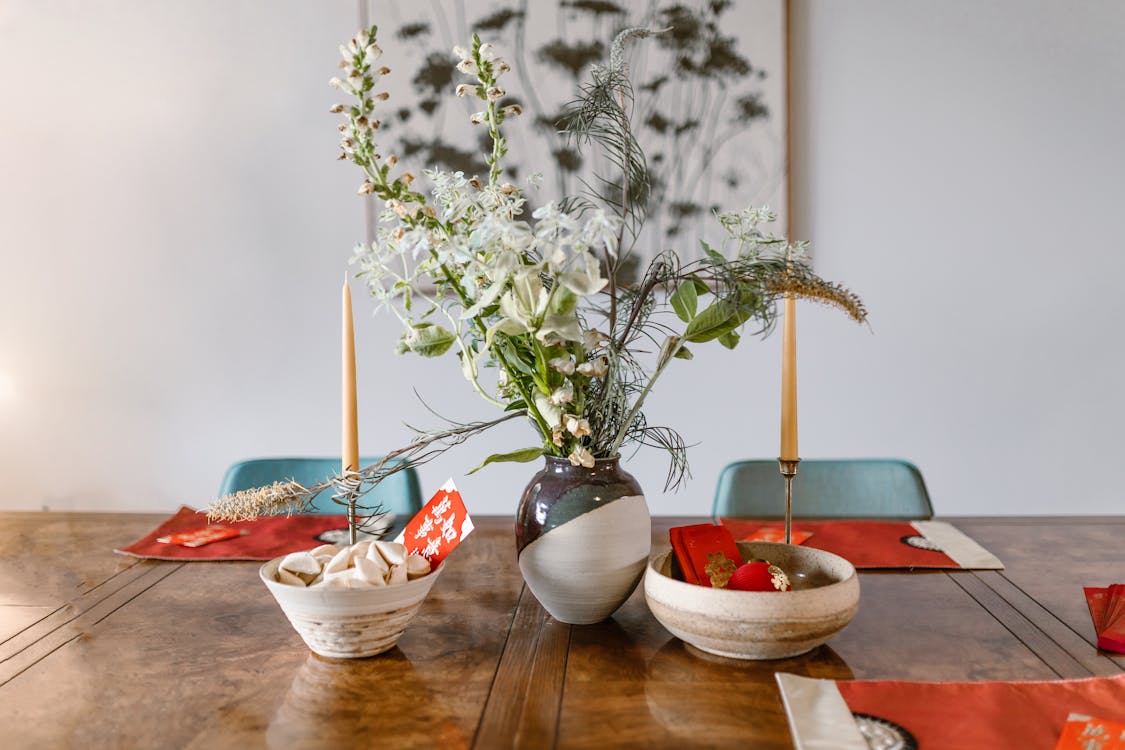What Gift Do You Give for Chinese New Year?
Chinese New Year, also known as the Spring Festival, is a time of celebration, family reunions, and vibrant traditions. One such tradition is the exchange of gifts, which plays a significant role in conveying good wishes for the new year.
In this article, we'll explore the importance of Chinese New Year gift-giving, discuss the symbolism behind traditional gifts, and provide guidance on choosing the perfect gift for the occasion.
Understanding Chinese New Year Tradition
Chinese New Year is the most important festival in Chinese culture. Gift-giving is deeply ingrained in the traditions, symbolizing blessings and prosperity for the year ahead.
The act of exchanging gifts strengthens bonds, and fosters harmony and abundance among Chinese people. But what makes a practical gift and what are appropriate gifts to get your Chinese friends?
5 Lunar New Year Traditions in Singapore
Spring Cleaning
In a Chinese home, families would engage in thorough cleaning to sweep away any bad luck before the Lunar New Year. It symbolizes a fresh start, and make their homes ready to welcome good fortune.

Reunion Dinner
The reunion dinner on Lunar New Year's Eve is a significant tradition where families gather to feast. It is a time for family bonding and the sharing of blessings for the year ahead.
Lion Dance Performances
Lion dance performances are common during the Lunar New Year celebration in Singapore. The energetic dances, accompanied by drumming and cymbals, are believed to ward off evil spirits and bring good luck to businesses and homes.
Red Packets
Exchanging red packets (hóngbāo) filled with cash is a common Chinese tradition during Lunar New Year. These packets symbolize prosperity and are given by adults to kids or a young family member.
Visiting Relatives and Friends
Throughout the Lunar New Year period, Singaporeans visit relatives and Chinese friends to exchange well wishes. It is customary to bring gifts, such as tangerines for your Chinese hosts as a nice gesture, and receiving guests with warmth and hospitality is an important tradition.
Symbolism of A Lunar New Year Gift
Traditional Lunar New Year gifts are imbued with symbolism and auspicious meanings. Red envelopes, known as "Hongbao" in Mandarin or "Lai See" in Cantonese, are perhaps the most iconic Lunar New Year gift exchanged.
Filled with money inside, these envelopes are known as "lucky money", as they represent good luck and prosperity. Fruits such as oranges symbolize wealth and abundance, while sweets like candy and dried fruits are offered as tokens of sweetness.
Traditional Chinese New Year Gift Ideas
Aside from red envelopes, there are several other traditional Chinese New Year gifts exchanged during this festive occasion in the Lunar calendar. Decorative items featuring auspicious symbols such as the Chinese character for "fortune" (福) are popular Lunar New Year gifts.
Traditional Chinese treats like "nian gao" (sticky rice cakes) also makes a great gift as they symbolize growth, prosperity, and the sweetness of life.
7 Chinese New Year Gifts According to Tradition
These traditional Chinese New Year gift ideas are common in Chinese culture and are given by Chinese people to convey their wishes for prosperity, health, and happiness during the Lunar New Year.
Red Envelopes (红包, Hóngbāo)
Red envelopes, or hóngbāo, are gifts filled with money. The red color is particularly significant, as it is associated with happiness and good fortune. Giving red envelopes during Chinese New Year is a way to share blessings and positive wishes for the upcoming year.

Mandarin Oranges
These are commonly given in a gift box during Chinese New Year, often in pairs of two cartons. These fresh oranges symbolize wealth due to their golden color. Additionally, the word for orange (橙, chéng) sounds similar to the word for success in Chinese.
Nian Gao (年糕)
Nian Gao, a sweet glutinous rice cake, is a traditional Chinese New Year treat. Its name carries a dual meaning, with "nian" meaning "year" and "gao" sounding like "tall" or "high." This implies progress, growth, and advancement. Eating and giving Chinese Nian Gao during the New Year is believed to bring about personal and professional elevation.
Chinese Tea & Tea Set
High-quality Chinese tea, such as green tea, oolong, or pu-erh, is a thoughtful and traditional gift. Tea reflects respect and conveys wishes for good health and longevity. Presenting a tea lover with premium tea leaves or a tea set makes a nice gift to share in the cultural significance of tea.
Fruits and Nut Gift Boxes
Presenting a gift box filled with dried fruits, nuts, and seeds symbolizes abundance, fertility, and the promise of new beginnings. These gift boxes represent the hope for a fruitful and prosperous year ahead, promoting good health and prosperity during the Lunar New Year.
Bak Kwa (肉干)
Bak Kwa, a sweet and savory dried meat typically made from pork, is a festive favorite during Chinese New Year. Its rich flavor and appealing presentation symbolize prosperity and good luck. They make thoughtful Chinese New Year gifts, as this delicacy is often associated with celebration and indulgence.
Liquor and Fine Wines
A nice bottle of traditional Chinese liquor, such as baijiu, or high-quality wines are popular gifts for Chinese New Year. These beverages are used to toast during celebrations, symbolizing joy, celebration, and strong familial bonds. Presenting liquor or fine wines in a pair of two bottles enhances the festive atmosphere, making the celebration even more memorable.
Modern Lunar New Year Gift Ideas
While traditional gifts remain popular, modern ones have emerged to cater to changing tastes and preferences. High-quality teas, an intricately designed tea set, and gourmet food baskets are thoughtful options for those looking to give a contemporary twist to their Chinese New Year gifts.
Feng Shui items, such as decorative figurines or lucky charms, are also gaining popularity for their ability to bring harmony and positive energy to the recipient's home.
7 Modern Ideas for Lunar New Year Gifts
Customized Tech Accessories
Personalized phone cases, laptop sleeves, or wireless chargers featuring auspicious designs in gold or the recipient's initials.
Virtual Experiences
Gift cards for online cooking classes, virtual wine tastings, or digital art workshops, allowing recipients to enjoy enriching experiences from the comfort of their homes.
Subscription Boxes
Monthly subscription boxes for gourmet snacks, tonic foods, or skincare products tailored to the recipient's interests, providing a continuous source of delight throughout the year.
Smart Home Gadgets
Smart speakers, smart bulbs, or smart plugs to enhance home automation and convenience, perfect for tech-savvy recipients looking to upgrade their living spaces.
Personalized Jewelry
Customized necklaces, bracelets, or rings made of gold and engraved with meaningful symbols or initials, adds a touch of elegance and sentimentality. Suitable for kids and gifting a little girl.
Sustainable Gifts
Eco-friendly products such as reusable water bottles, bamboo utensil sets, or plant-based skincare kits, promoting environmental consciousness and ethical consumption.
Digital Artwork or NFTs
Unique digital artworks or non-fungible tokens (NFTs) from emerging artists, offering a modern and innovative gift option for art enthusiasts and collectors.
10 Delicious Snacks as Chinese New Year Gifts
These delicious Lunar New Year snacks are not only suitable for kids and adults, but also conveys good wishes for prosperity, happiness, and auspiciousness in the new year.
Here's a list of 10 edible snacks perfect for Chinese New Year gifts.
Pineapple Tarts (凤梨酥)
These gold buttery pastries filled with sweet pineapple jam symbolize prosperity and are a beloved treat by both adults and kids during the festive season.
Almond Cookies (杏仁饼)
Crisp and fragrant almond cookies are a classic Lunar New Year snack, representing good fortune and happiness.
Seaweed Peanut Rolls (花生海苔卷)
Crunchy seaweed-wrapped peanut rolls are a delightful combination of savory and nutty flavors, often enjoyed as a traditional snack during the festivities.
Love Letters (鸡蛋卷)
These crispy, wafer-thin biscuits, also known as kueh kapit, are rolled into cylindrical shapes and symbolize family unity and love.
Dried Shrimp Rolls (虾枣)
Crispy and savory, dried shrimp rolls are made with minced shrimp and spices wrapped in bean curd skin, representing happiness and abundance.
Cashew Nut Cookies (腰果饼)
Buttery cookies studded with roasted cashews, symbolizing prosperity and abundance, are a popular choice for gifting during Lunar New Year.
Sesame Peanut Bars (芝麻花生糖)
Chewy and nutty sesame peanut bars, made with toasted sesame seeds and peanuts bound together with caramelized sugar, symbolize happiness and longevity.
Candied Winter Melon Strips (糖瓜)
Sweet and chewy candied winter melon strips, also known as tang gua, are a traditional Lunar New Year delicacy symbolizing a sweet life ahead.
Coconut Cookies (椰丝饼)
These crispy and fragrant cookies, made with shredded coconut and coconut milk, symbolize good luck and happiness.
Spicy Dried Shrimp Floss Rolls (虾米松)
Spicy and addictive, dried shrimp floss rolls are made with shredded dried shrimp and spices, symbolizing joy and laughter during the festive season.
Factors to Consider When Choosing a Gift
When selecting a gift for Lunar New Year, it's essential to consider the recipient's preferences, cultural background, and the nature of your relationship with them. Opt for gifts that are thoughtful, respectful, and aligned with Chinese cultural norms.
Consider the significance of symbolism and choose items that convey good wishes for prosperity, happiness, and longevity.
Gift Etiquette
In Chinese culture, there are certain etiquettes to observe when giving gifts during Chinese New Year. Always present gifts with both hands as a sign of respect. Avoid giving gifts in sets of four, as the number four is considered unlucky.
Similarly, sharp objects or gifts with negative connotations is a big no no, as they are considered bad luck.
Conclusion
In conclusion, Lunar New Year gift-giving reflects the values of generosity, respect, and goodwill. Whether you choose a traditional or modern gift, the act of giving and receiving gifts fosters bonds of love and harmony.
By selecting thoughtful gifts that convey best wishes for prosperity and happiness, you can make it a truly joyous occasion for your loved ones.
Frequently Asked Questions (FAQs)
What is the popular gift for Chinese New Year?
A popular gift for Chinese New Year is the red envelope (红包, hóngbāo) containing cash. These envelopes are highly valued as they symbolize good luck, prosperity, and protection against evil spirits. This traditional gift is widely appreciated and given to family, friends, and colleagues as a way to extend heartfelt wishes for a prosperous and auspicious new year.
Are you supposed to give gifts for Chinese New Year?
Yes, giving gifts is an important part of Chinese New Year celebrations. It is a way to express good wishes, gratitude, and respect. Traditional gifts include red envelopes (红包, hóngbāo) filled with money, mandarin oranges, Nian Gao (sweet glutinous rice cake), and other items symbolizing prosperity, health, and happiness. These gifts are exchanged among family members, friends, and colleagues during the festive period.
What is a good luck gift in Chinese?
A good luck gift in Chinese culture is often a red envelope (红包, hóngbāo) filled with money. Other popular good luck gifts include mandarin oranges, which represents wealth and success, and Nian Gao (年糕), a sweet glutinous rice cake that represents progress and growth. These gifts are believed to bring positive energy and good fortune to the recipient.
What is traditionally given at Chinese New Year?
Traditionally, gifts given at Chinese New Year include red envelopes (红包, hóngbāo) containing money, which symbolize good luck and prosperity. Mandarin oranges, often given in pairs, represent wealth and good fortune. Nian Gao (年糕), a sweet glutinous rice cake, is another common gift symbolizing progress and growth. Additionally, high-quality tea, assorted dried fruits and nuts, and Bak Kwa (sweet dried meat) are popular choices.

